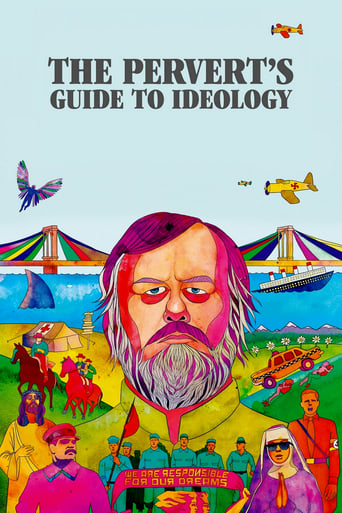

Save your money for something good and enjoyable
... View MoreFun premise, good actors, bad writing. This film seemed to have potential at the beginning but it quickly devolves into a trite action film. Ultimately it's very boring.
... View Moreif their story seems completely bonkers, almost like a feverish work of fiction, you ain't heard nothing yet.
... View MoreWorth seeing just to witness how winsome it is.
... View MoreThe accent is brave, hardly penetrable. Captions are really necessary. But the title of the movie says it all: it IS Slovenian humor at an abstract, high-brow level. The host mitigates the Freudian legacy as he perverts - in a decreasing order - (1) Marx (2) Walter Benjamin and the Frankfurt School at large (3) Lacan. His universalizing framework comes from Lacanian psychoanalysis, although he is as 'revealing' as Lacan. The greatest apparent influence on Zizek seems to be that of Roland Barthes's 'Mythologies'. As if he were kinda Roland The Hip Semiologist, Zizek analyzes everything from the perspective of the 'myth,' revealing at every opportunity a new approach, criticizing our surrounding, culturally globalized habitat, and insinuating what might be its intrinsic authenticity. The film is essentially an illustrated conference in the style of other mass culture analysts such as Jacob Bronowski, John Berger, Robert Hughes, Kenneth Clark. Zizek is not interested in the respective ideology of the filmmakers he quotes. He uses fragments of films as illustrative of real life processes and their 'myths', not specifically Nazism or Communism, but rather the way we all shape our lives and the universal themes that connect our 'mythological' subconscious needs.
... View MoreThe hyperactive Slovenian philosopher Zizek uses extracts for movies to show to us how the things we believe in (our ideology) are created by the external society. He goes in the sublime message of several scene's of famous movies. Once again the sound of music is his favorite. The only question that must be raised is the chicken and egg problem. Do these messages make society or do the desires of society make these messages. With advertisements it is of course clear that the message brings the ideology of the maker has to be pushed to us, but with movies we can have more doubt. This is not addressed in this movie. Furthermore I question if movie is the right medium to bring the message of Zizik. I thought in many moments that the images of the movies distracted from the story he was telling, my mind went into the movie, not into Zizek's story. For personal use I recorded the sound and listening to that I was much more able to think about the messages of Zizek.But all in all a worthwhile evening
... View MoreA superb documentary which takes a sample of Zizek's capitalism critique and delivers it in bite-sized chunks complete with film illustrations and a dash of wit.While less focused than his Pervert's Guide to Cinema, here we see him take the ideas from film and open them out to our social and ideological (obviously) reality. He questions the very nature of ideology (often coming close to utilising the process of deconstruction, something he has rejected previously) and how it filters out reality. The film, one could say, is an attempt to make us aware of our ideological constraints. At times it's hard to know if his point is throwaway witticism or central point, but that is the nature of his writing too.Zizek does look to the future in a positive way, commenting on how OWS and the Arab Spring are examples of society finally looking beyond neo-capitalism (whose ideology is that there is no other ideology), though it would be good to delve further into these examples. But Zizek is aware that solutions are not easy to come by, and finishes more on a question than an answer.This is a strong documentary that occasionally lags but for the most part is engaging and provocative.
... View MoreIn Marx Reloaded, Zizek's previous film, this hyperactive Slovenian philosopher was forced to share the screen with some of the world's most clued-up thinkers. It was a great thought-provoking spectacle, full of provocative statements (including his definition of communism as "a world where everyone is allowed to dwell in their own stupidity"). But for me Zizek works best in the company of others. Let him loose, as does Fiennes here, with the freedom to write a script which I felt at times she was struggling to follow, and the insights dry up pretty soon. I wasn't made to think here. And frankly the title was a bit lame - why not call it "A Pervert's Guide to Cinema 2"? Since the formula is exactly the same as the previous film Fiennes directed him in. The sketches in which Zizek appears in locations from famous movies (The Sound of Music was my favorite) are relentless, and at over 2 hours needed reigning in. I mostly enjoyed it, but only as a silly romp. I took nothing away from the cinema except a belly full of popcorn.
... View More